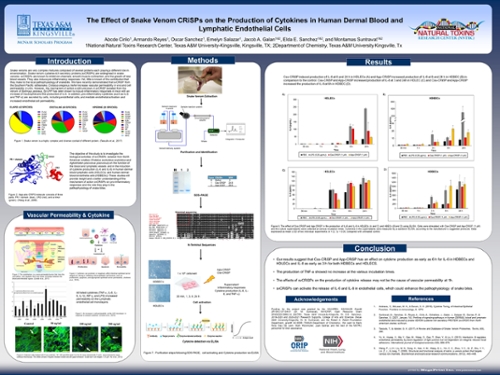Snake venoms are very complex mixtures composed of several proteins each playing a different role in envenomation. Snake venom cysteine-rich secretory proteins (svCRiSPs) are wide spread in snake venoms. svCRiSPs are known to inhibit ion-channels, smooth muscle contraction, and the growth of new blood vessels. They also induce pro-inflammatory responses. Yet, little is known of the contribution that they make to the local pathophysiology of snakebite. A svCRiSP isolated from the venom of Bothrops jararaca, Bj-CRP has been shown to induce inflammatory responses in mice with an increase of neutrophils and the production of IL-6. It has been shown that inflammatory cytokines alter microvascular and lymphatic endothelial cell function. We have previously showed that svCRiSPs (Css-CRiSP isolated from Crotalus scutulatus scutulatus and App-CRiSP from Agkistrodon piscivorus piscivorus) increase vascular permeability in vivo and cell permeability in vitro. The objective of this study was to study the ability of Css-CRiSP and App-CRiSP to induce the release of the pro-inflammatory cytokines tumor necrosis factor alpha (TNF-), interleukin-6 (IL-6); IL-6 and the chemokines IL-8 in human dermal blood lymphatic cells (HDLECs) and human dermal blood endothelia cells (HDBECs). HDBECs and HDLECs were treated with Css-CRiSP or App-CRiSP for 30 min, 1, 3, 6, and 24 h. Cytokines in the supernatant were measured by using a sandwich enzyme-linked immunosorbent assay (ELISA). Both Css-CRiSP and App-CRiSP were able to induce the production of IL-8 and IL-6, but not TNF- in HDBECs and HDLECs. The level of IL-6 and IL-8 were dependent on the incubation times. From the data these studies will provide insight and a better understanding of the mechanism of action svCRiSPs on pro-inflammatory responses and the role they play in the pathophysiology of snake bites.
Faculty Mentor: Dr. Montamas Suntravat
National Natural Toxins Research Center


